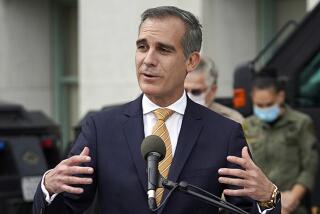Panel Probes Ex-Bush Aide on Contra Supply Scheme
- Share via
WASHINGTON — Amid harsh questioning from Democratic senators and praise from Republicans, Donald P. Gregg, ambassador-designate to South Korea, denied Friday that he knew full details of the scheme to supply military aid to Nicaragua’s Contras in 1985, when such aid was outlawed by Congress.
At his confirmation hearing before the Senate Foreign Relations Committee, Gregg, who was then-Vice President George Bush’s national security adviser, faced a barrage of questions centering on his relationships with retired CIA agent Felix Rodriguez, a long-time friend and operative in the Contra resupply network, and Oliver L. North, the former White House aide who last week was convicted of three felonies stemming from his involvement in the scheme.
Rodriguez first told him about his involvement in August, 1986, Gregg said, but Gregg testified that he did not tell Bush.
Says North Was Incorrect
Gregg asserted that North gave incorrect testimony at his trial when he said that Gregg was informed of arms shipments to the Contras. And, he said, North was wrong in testifying that Gregg introduced him to Rodriguez.
“I would just have to challenge that,” Gregg said. Referring to North’s statements, he said: “I regret to say they are just not true. I don’t want to add to his problems.”
For the first time, Gregg offered what he called a “speculative explanation” of two 1986 documents from his office which said that Bush was to be briefed “on the war in El Salvador and resupply of the Contras.”
His explanation: There was a “garbled reference” to “resupply of the ‘copters”--helicopter parts for Salvadorans in their battle against leftist rebels--and did not refer to resupply of the Contras. Gregg testified that he could not say whether an aide or a secretary was responsible for the garble.
Four-Hour Session
The inconclusive Senate session, which lasted almost four hours, took on a stark air of partisanship, as Democrats relentlessly pummeled Gregg, while GOP senators defended him and accused the Democrats of trying to attack Bush through Gregg.
Sen. Alan Cranston of California led the Democratic attack, charging in a detailed opening statement that Gregg has made “sweeping denials” of knowledge about selling arms to Iran and diverting money to the Contras “apparently in order to cover up the truth and to limit embarrassment to your boss, . . . George Bush.”
Citing documents from North’s trial and from elsewhere, Cranston said that “a substantial amount of new evidence has come to light that raises further fundamental questions about your suitability to be an ambassador.”
‘Keep Your Cool’
But Sen. Jesse Helms (R-N.C.) told Gregg that the Democrats were planning to “hang you and then give you a fair trial.” He urged Gregg to “keep your cool,” adding that the United States would be fortunate to have as ambassador someone of such “dedication and experience.”
Cranston, ending the hearing without a vote, said that the committee will study the documents and other matters involving the nomination.
Meanwhile, attorneys for Joseph F. Fernandez, the former CIA station chief in Costa Rica who is charged with lying about his role in resupplying arms to the Contras, argued at a federal court hearing in suburban Alexandria, Va., that they cannot wage a suitable defense if they have to comply with the Classified Information Procedures Act.
Under that law, defense attorneys must notify prosecutors which classified documents they intend to use during trial.
Cites Government Advantage
Thomas Wilson, one of the Fernandez lawyers, told U.S. District Judge Claude Hilton that “100% of the domain of evidence is classified,” adding that Fernandez would have to “reveal his defense in a way that would be wholly unreciprocated by the government.”
Geoffrey Stewart, a prosecutor, said the defense “overstates what is required,” asserting that much of the information in the case does not involve classified material.
Attorneys for North tried a similar argument but failed, and the trial proceeded under the classified procedures law.
More to Read
Get the L.A. Times Politics newsletter
Deeply reported insights into legislation, politics and policy from Sacramento, Washington and beyond. In your inbox twice per week.
You may occasionally receive promotional content from the Los Angeles Times.









